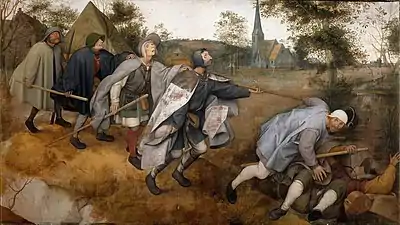The blind leading the blind
"The blind leading the blind" is an idiom[1] and a metaphor in the form of a parallel phrase, it is used to describe a situation where a person who knows nothing is getting advice and help from another person who knows almost nothing.[2]
| Look up blind leading the blind in Wiktionary, the free dictionary. |
History
The idiom can be traced back to the Upanishads, which were written between 800 BCE and 200 BCE.[3]
Abiding in the midst of ignorance, thinking themselves wise and learned, fools go aimlessly hither and thither, like blind led by the blind.
A similar metaphor exists in the Buddhist Pali Canon, composed in North India, and preserved orally until it was committed to writing during the Fourth Buddhist Council in Sri Lanka in 29 BCE.
Suppose there were a row of blind men, each holding on to the one in front of him: the first one doesn't see, the middle one doesn't see, the last one doesn't see. In the same way, the statement of the Brahmans turns out to be a row of blind men, as it were: the first one doesn't see, the middle one doesn't see, the last one doesn't see.
— Canki Sutta (MN 95)[5]
The expression appears in Horace: Caecus caeco dux ("the blind leader of the blind"). Horace was the leading Roman lyric poet during the time of Augustus (27 BCE – 14 CE)[6]
The saying appears several times in the Bible with similar stories appearing in the gospels of Matthew, Luke and Thomas, possibly via the Q source.
"Every plant that my heavenly Father has not planted will be pulled up by the roots. Leave them; they are blind guides [of the blind]. If a blind man leads a blind man, both will fall into a pit."
— Matthew 15:13-14
Sextus Empiricus (160 – 210CE) compares ignorant teachers and blind guides in Outlines of Scepticism:
"Nor does the non-expert teach the non-expert—any more than the blind can lead the blind."[7]
The phrase appears in Adagia, an annotated collection of Greek and Latin proverbs, compiled during the Renaissance by Dutch humanist Desiderius Erasmus Roterodamus. The first edition, titled Collectanea Adagiorum, was published in Paris in 1500 CE.[8]
Artistic depictions

Perhaps the most famous artistic depiction of the phrase is Pieter Bruegel's The Blind Leading the Blind. The distemper on canvas painting was completed in 1568, and is currently in the collection of the Museo di Capodimonte in Naples, Italy.
References in popular culture
"The Blind Leading the Blind" is a poem by Pulitzer prize winning poet Lisel Mueller
"Blind Leading the Blind" is a song by Lynsey de Paul. It was the 'B' side of her 1973 single, All Night.
"Blind leading the blind" was a song written by Mick Jagger, performed by Mick Jagger and Dave Stewart for the soundtrack of the 2004 film Alfie.
In a notable episode of Sex and the City Samantha tells Carrie that giving her advice is like 'the blind leading the blind'.
The song "Ego Tripp" by Mushroomhead includes the lyrics, "as the blind lead the blind on a crusade for sight."
The song "Disconnected" by Keane includes the lyrics, "We walk in circles, the blind leading the blind."
"Blind Leading the Blind" is a song by Mumford & Sons. It was released on October 23, 2019
The play A Streetcar Named Desire by Tennessee Williams includes the phrase "The blind are leading the blind.".
The song "Manunkind" by Metallica has the phrase "blind lead blind" in the "quest to find faith in manunkind".
The song "Estallando desde el océano" by argentinian band Sumo includes the lyrics "Firefly cars, women rushing past The road was long and the race was fast Gradually I fell behind It was the blind leading the blind"
References
- "What does 'Blind leading the blind' mean? – Idiom Definition". UsingEnglish.com. Retrieved 2017-11-27.
- "Meaning of the phrase blind leading the blind at dictionary.cambridge.org".
- Gary Martin. "'The blind leading the blind' – the meaning and origin of this phrase". phrases.org.uk. Retrieved 2017-11-27.
- Juan Mascaró (tr), The Upanishads, Penguin Classics, 1965, ISBN 0-14-044163-8, p. 58.
- Canki Sutta (Majjhima Nikaya 95) Archived 2017-05-27 at the Wayback Machine, translated by Thanissaro Bhikkhu
- Sullivan, Margaret A. (September 1991). "Bruegel's Proverbs: Art and Audience in the Northern Renaissance". The Art Bulletin. College Art Association. 73 (3): 431–466, 463. doi:10.2307/3045815. JSTOR 3045815.CS1 maint: ref=harv (link)
- Sextus Empiricus, Outlines of Scepticism (tr. J Annas and J Barnes), Cambridge University Press, 2000, ISBN 978-0-521-77809-1, book III: 259
- Proverbs taken chiefly from the Adagia (1814)
External links
 Media related to The Blind Leading the Blind at Wikimedia Commons
Media related to The Blind Leading the Blind at Wikimedia Commons